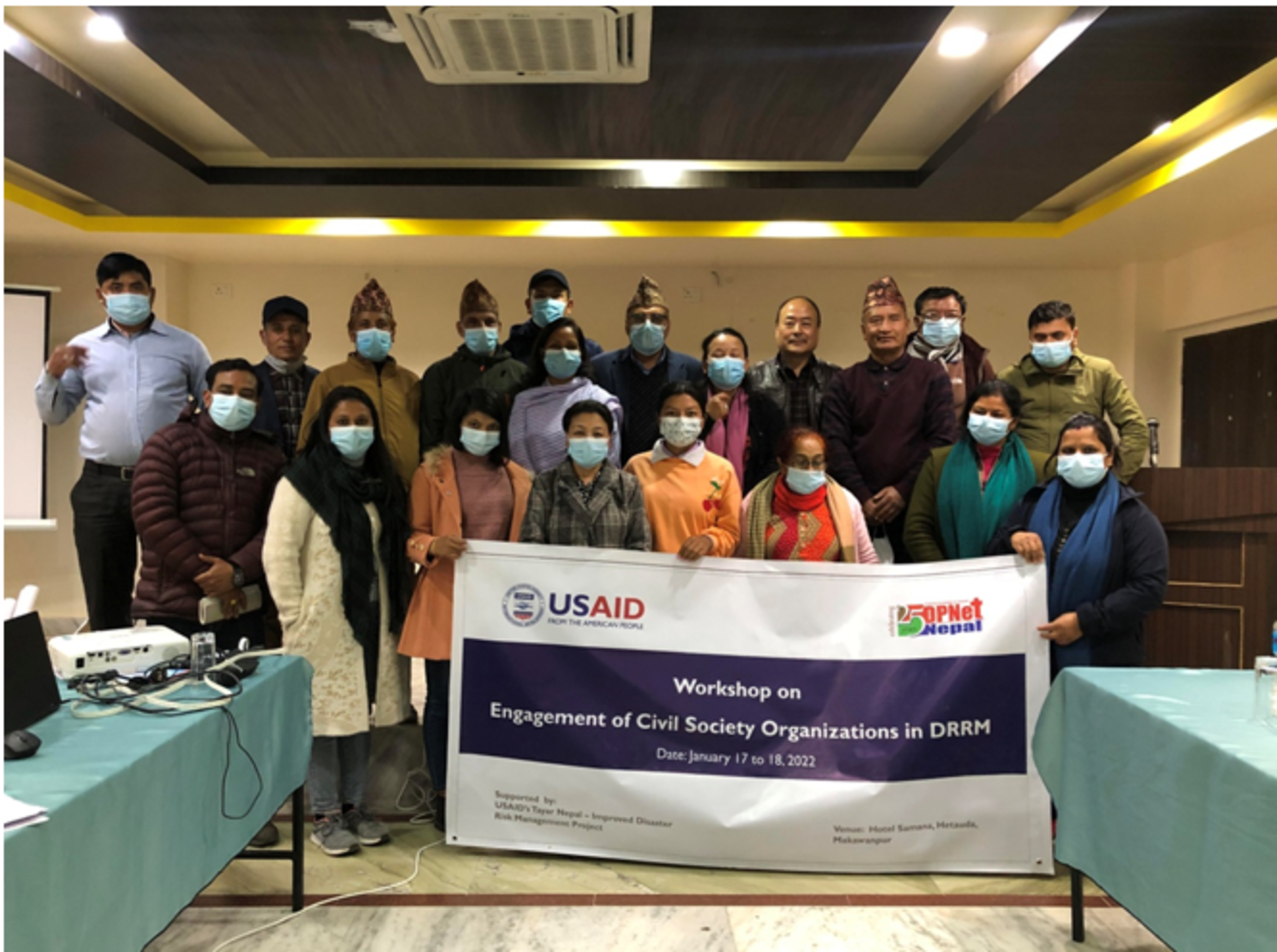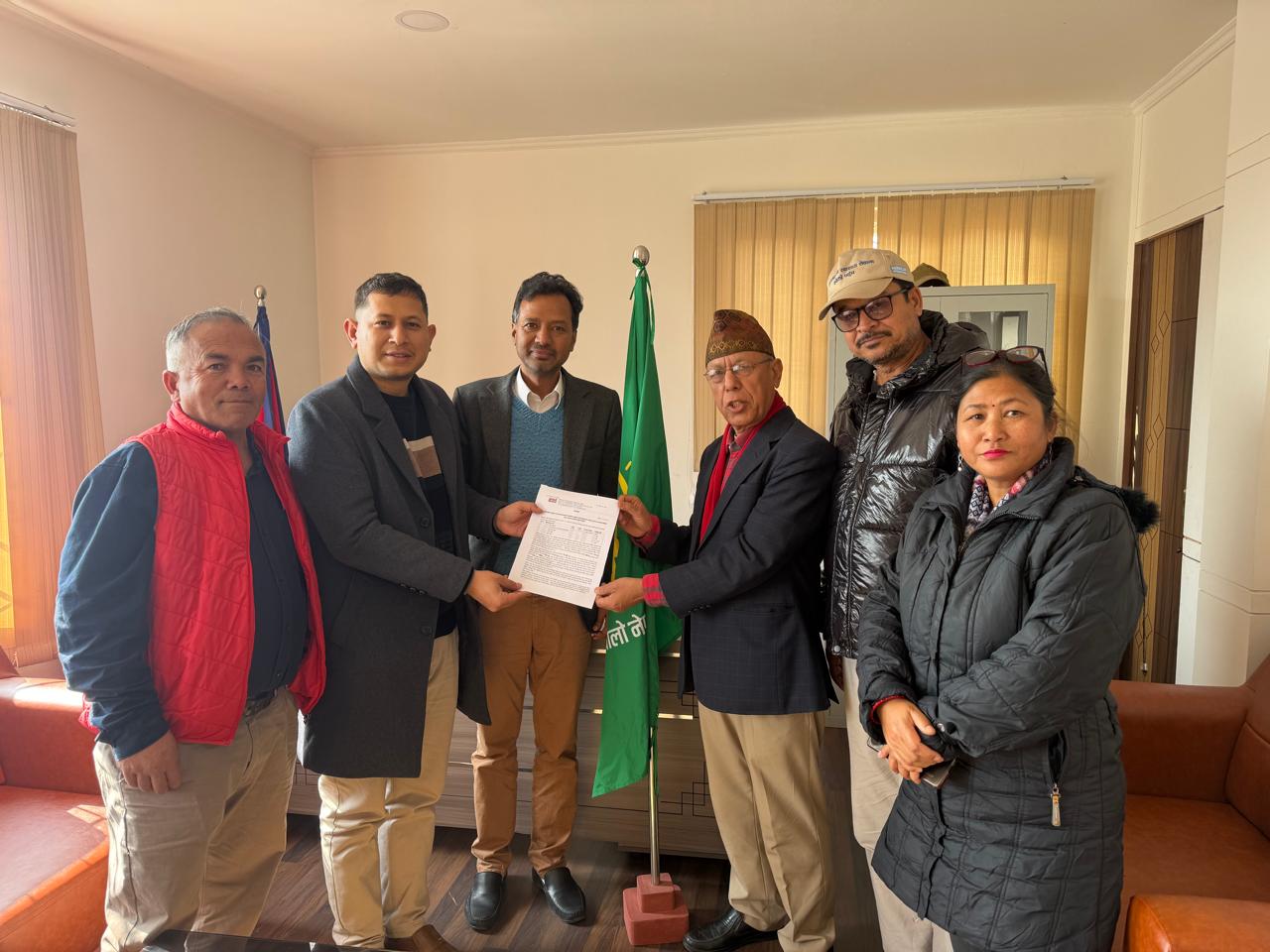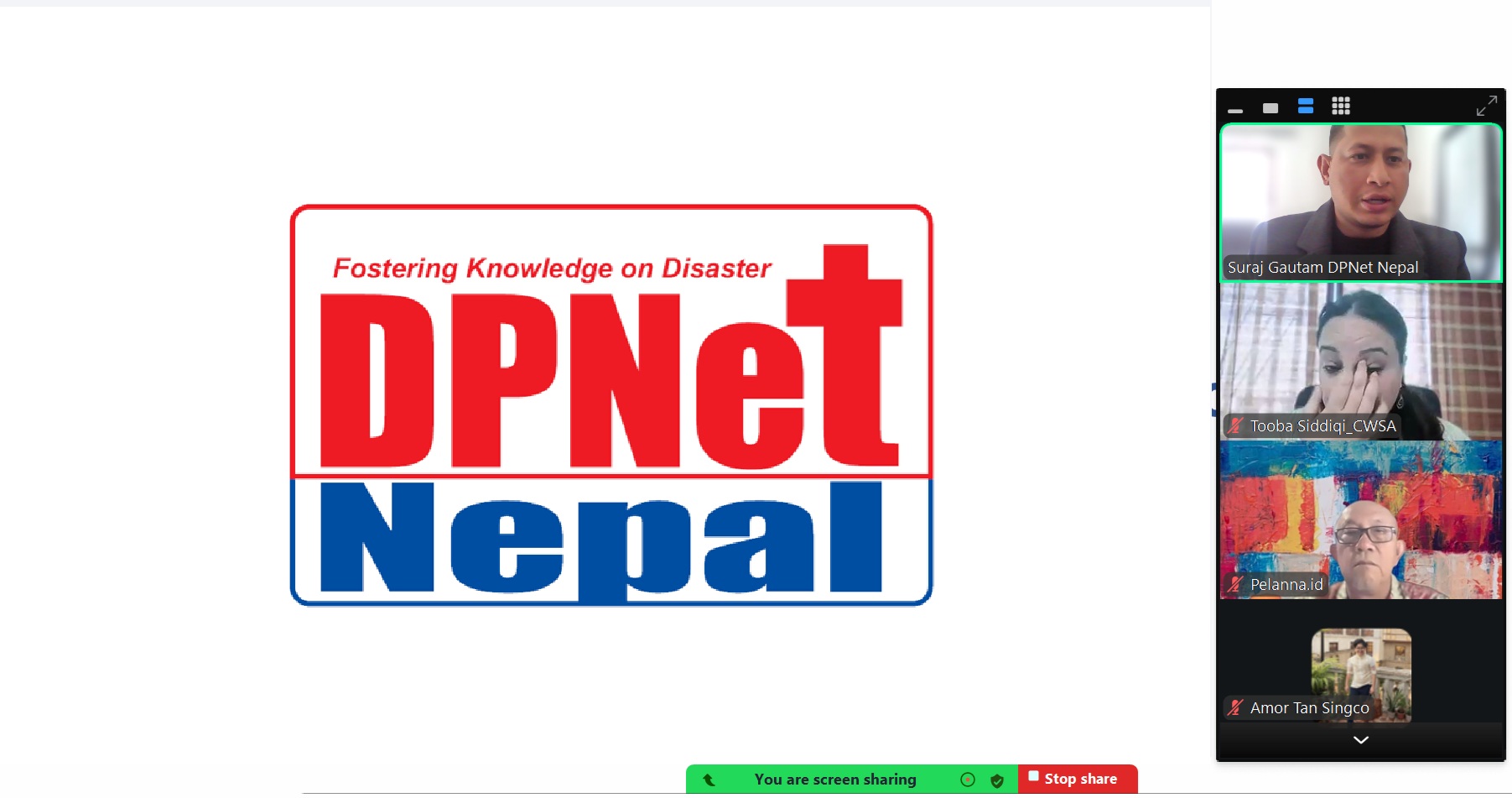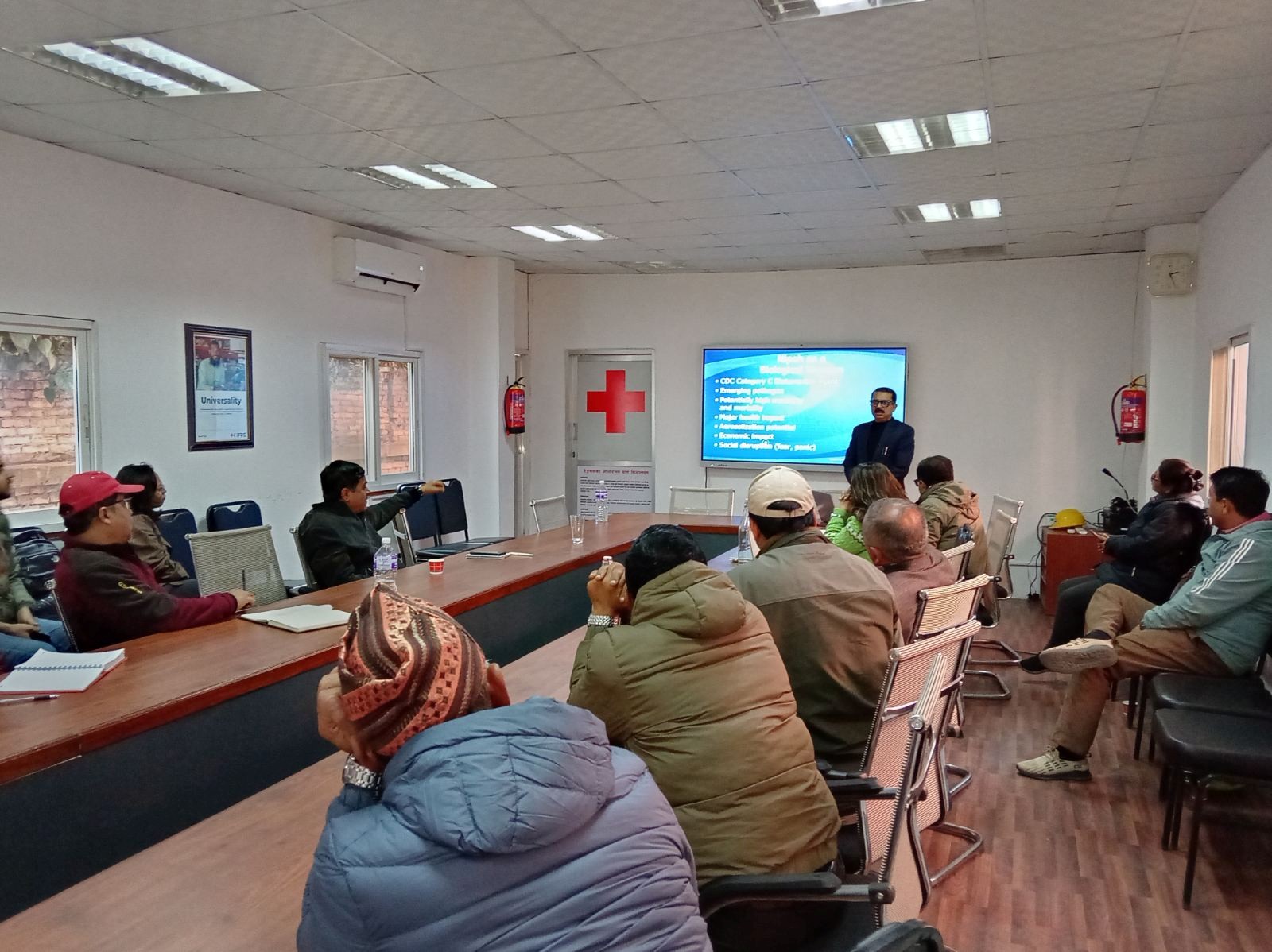Workshop on Engagement of Civil Society Organization in DRRM
Jan 23, 2022

The two days workshop on Engagement of Civil Society Organization in DRRM was organized by DPNet on 17th and 18th Jan, 2022 at Hotel Samana, Hetauda. The workshop was facilitated by Santona Devkota, Program Coordinator, DPNet- Nepal. The program was chaired by the Chairperson of DPNet Mr. Surya Bahadur Thapa and the Chief Guest of the program was Mr. Krishna Khanal, Internal affairs and Law Minister, Bagmati Province. The chairperson of DPNet Mr. Surya Bahadur Thapa shared the objectives of the program along with sharing the historical perspective of DRRM in Nepal. He addressed the participants with the importance of community based disaster management as the community people are the first who can cope against the risk and support each other during rescue. All together 27 participants joined the program.
Major Highlights:
- The internal affairs and Law minister Mr. Krishna Pradad Khanal shared his gratitude towards DPNet for the invitation and the initiation being undertaken by the organization to support the provincial government to enhance its capacity towards DRRM. He expressed: “Currently, the provincial government is working on housing reconstruction and resettlement of the disaster displaced community through its Janata Awass (Peoples Home) program. There has been a trend where the local government just randomly fill the format as shared by the federal government. There is no proper assessment conducted, no events of discussion among stakeholders is conducted, neither discussion among the executive members of the municipality are shared with the documents for review before making it a legal document. Furthermore, the government has not prioritized DRRM in terms of allocating the budget. The ministry has requested various agencies working in the field of DRRM to provide recommendations to make the DRM interventions more effective. Resettlement of disaster displaced communities has been prioritized. The government is planning to address the request from people being homeless due to disaster to prioritize house construction instead of focusing on emergency relief support. The provincial government is also planning to conduct a workshop with participants from all three tiers of governments, experts, and CSOs with an aim of developing a collective plan of action. The ministry of internal affairs and Law is in discussion with the provincial government to increase the budget on the thematic area of preparedness and mitigation.
- The technical session was facilitated by Mr. Ram Gurung. He shared about Basic Terminologies on DRRM, Sphere Guidelines and Core Humanitarian Standard (CHS) and Miscellaneous. Wrap-up and feedback session; the first day of the workshop was concluded by collecting feedback from the participants. The majority of the participants accepted that they never have heard about sphere standards and core humanitarian standards. One of the participants realized that their past experience of relief distribution in many cases faced obstacles and that would have been eliminated if they had followed sphere standard. One of the participants from the consumer right protection forum stated: “We came to know about various theoretical aspects of DRRM. We have been carrying out various humanitarian efforts during the post disaster situation. The sessions will help us to make our efforts more scientific, effective and efficient in future. The sessions also were fruitful for linking our thematic area with disaster”.
Day 2:
Opening session: The second day of the workshop started with a basic review of the previous day. Mr. Surya Bahadur Thapa introduce Secretary of Bagmati Province Internal Affairs committee Mr. Tripurari Brakhel. Mr. Brakhel further addressed the participants and shared the activities being carried out by the Provincial DRRM Committee. He expressed: “The internal affairs committee is a provincial assembly committee leading the DRRM component. The committee has full authorization with substantial allocation of budget to carry out its initiatives. The 4 subjective committees are formed each led by a particular member of the Province assembly”.
Opening session: The second day of the workshop started with a basic review of the previous day. Mr. Surya Bahadur Thapa introduce Secretary of Bagmati Province Internal Affairs committee Mr. Tripurari Brakhel. Mr. Brakhel further addressed the participants and shared the activities being carried out by the Provincial DRRM Committee. He expressed: “The internal affairs committee is a provincial assembly committee leading the DRRM component. The committee has full authorization with substantial allocation of budget to carry out its initiatives. The 4 subjective committees are formed each led by a particular member of the Province assembly”.
Major Discussions:
- Preparedness is one of the best technique to cope against disaster so we will focus on preparedness aspects most.
- Lobby and advocacy with government agencies for effective implementation of DRM policies and plans
- Mass awareness regarding preparedness should be first priority.
- Sensitization activities needs to be carried out.
- Enhancing and making inter stakeholder coordination and communication effective
- Supporting local government to adopt more scientific methods during their policies formulation by using actual facts and information
- Making awareness on sphere standards and CHS among the government and non-government agencies working on rescue and relief
- CSOs should work as a bridge between community and government
- Government and other agencies should prioritize people with disability, and other most vulnerable section of the community to enhance their capacity to cope against disaster.
- Identifying hazards, vulnerable zones, community capacity and resources at local level and suggesting the government to prepare plans accordingly.
- Information dissemination, policy dialogues and other relevant activities for the effective engagement with the government.
- The discourse took put almost the nuts and bolts of DRRM, CCA and how CSO as an substance working closely with the influenced communities can play urgent parts in carrying the voice of those to higher level to be listened as well as the part that can be played in making them get it against disaster event and plan in development.
- CSOs can support the government in data management since it works in the frontline.
- The most essential part enhancement the capacity of the, CSOs team in DRRM
- The discussion was carry about the technical and institutional capacity for provincial and local governments effective implementation of DRRM act 2017 and local government operation act 2017; and mobilization of different clusters to integrate and mainstream DRR into development plans and programs.
- Women, senior citizens and the persons with disability as well as other minority groups are highly vulnerable issues needed to address in the all sphere DRRM interventions.
The closing session participants express their reflection and give thanks to the organizer for the very essential workshop. They highlighted the importance of capacity enhancement and sensitization to CSOs in DRRM. Finally, the DPNet Chairperson gave thanks to every participant, the DPNet team and closed the program.











